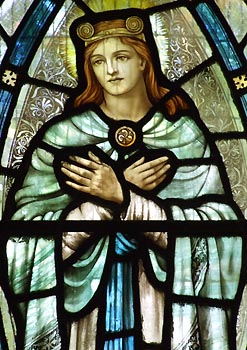Santez Kanna
Un article de GrandTerrier.
1 Fiche signalétique
|
2 Almanach
| |||||||||||||||||||||
3 Sources
|
4 Iconographie | |||||||||||||||||||||
5 Monographies
Site Bretagne.net :
Kanna
prénom féminin, fête le 10 mars
Origine du prénom
Epouse de saint Sagorn.
Diminutif : Kannaig
prénoms celtiques et bretons d'Albert Deshayes :
Kanna
Diminutif : kannaig
Formé sur kann qui, en vieux breton, avait le sens de "blanc, brillant".
D'origine bretonne selon sa Vie, cette sainte était la fille de Tewdwr Llydaw, lui-même fils d'Emyr Llydaw. Elle épouse saint Sadorn et tous deux suivent Kavan en Bretagne insulaire. À la mort de son mari, elle épouse Alltu Redegog dont elle aura deux enfants, les saints Eliant et Tegfan.
Site Early British Kingdoms :
St. Canna
(Born c.AD 510)
(Welsh: Cenaf; English: Candice)
Canna was a Breton princess, traditionally a daughter of Tewdwr Mawr ap Emyr Llydaw. This man, however, appears to have actually been the grandson, rather than the son, of Emyr Llydaw (Budic II) and was probably the lady's brother. She married her cousin, Prince Sadwrn, a man somewhat her elder, and, together, they became the parents of St. Crallo.
The family moved to South Wales, where Sadwrn got religion and appears to have deserted Canna in order to become a hermit on Anglesey, where he later died. Canna soon remarried to Alltu Redegog, a descendant of King Cadrod Calchfynedd, by whom she had another son, St. Elian Geimiad (the Pilgrim). Depictions of her in art holding a staff which miraculously flowers may suggest a lost legend, similar to that of St. Ciaran's mother, whereby, upon feeling the pangs of childbirth, she grasped at a dry rowan stick which immediately burst into leaf. Which child this would refer to is unknown.
In retirement, Canna became a nun, founding churches at Llangan and Llanganna, and possibly Canton, in Glamorganshire. Her main residence was at Llangan in Caermarthenshire, where her stone 'chair' an still be seen inscribed with her name. The nearby Fynnon Ganna (Canna's Holy Well) was, for centuries, a popular place of pilgrimage.
Canna's festival is celebrated on 25th October. She should not be confused with St. Cain ferch Brychan or St. Caen ap Caw.
